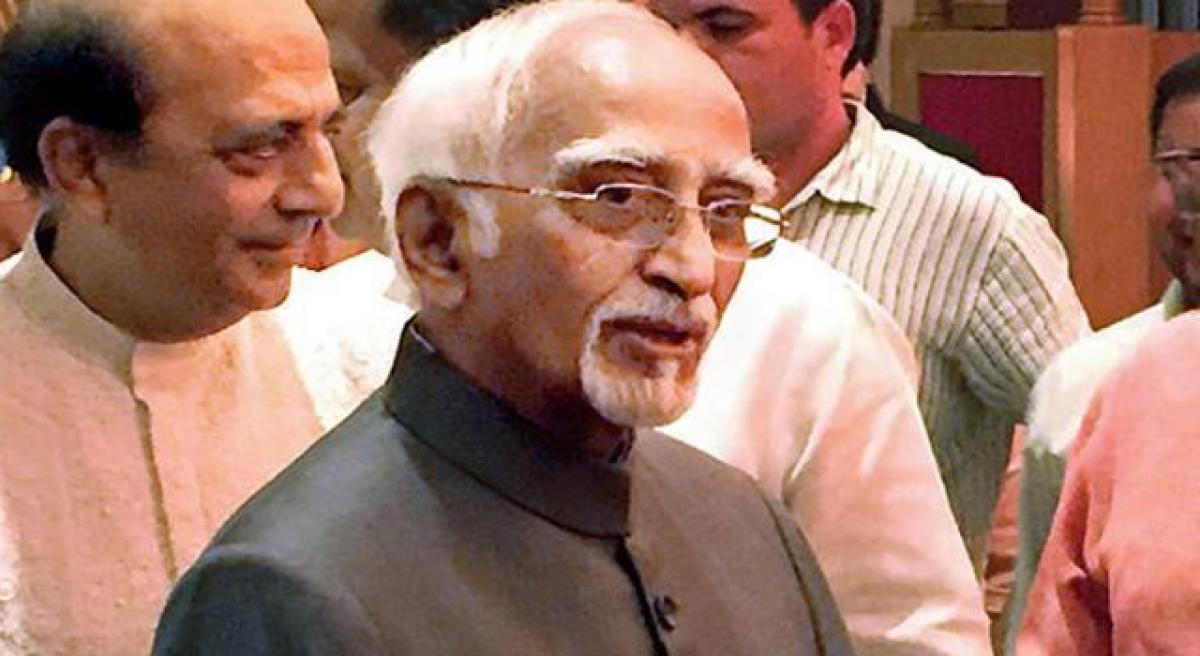Live
- Manipur violence: Assam Police mount 24x7 vigil along inter-state border
- The Impact of Wellness Programs on Employee Engagement and Retention
- IS claims responsibility for deadly attack in Afghanistan
- The Future of MSMEs: Embracing Innovation and Sustainability for Growth
- Army chief returns from Nepal after defence cooperation talks
- ‘Vikatakavi’ shines at IFFI, Goa
- Tamannaah highlights the strengths of south Indian cinema
- Shivanna’s ‘BhairathiRanagal’ locks Telugu release date
- Startup Ecosystem and Technology: Revolutionizing India’s Retail Fashion
- SDT’s ‘Satya’looks favorite at Filmfare Short Film Awards 2024
Just In

Prime Minister Narendra Modi’s reluctance to attend the Non-Aligned Movement (NAM) summit in Venezuela on September 17-18 amid reports of a decision to depute Vice-President Hamid Ansari has cast serious doubts on India’s strategic autonomy policy based on NAM foundations.
Prime Minister Narendra Modi’s reluctance to attend the Non-Aligned Movement (NAM) summit in Venezuela on September 17-18 amid reports of a decision to depute Vice-President Hamid Ansari has cast serious doubts on India’s strategic autonomy policy based on NAM foundations.
Fast-changing geopolitics is being cited as reason for India’s inability to continue its military neutrality stance. This at a time when India is already being seen as US pivot to Asia to strategically contain China. However, one wonders if the NAM which had helped India weather even the Cold War headwinds cannot sustain its principled stand and protect its interests, going forward.
The just-concluded G-20 summit, in the wake of US-India military logistics pact followed by Pakistan formalising a strategic defence pact with China, saw India coming into its own. Modi took up touchy issues with Chinese President such as Pakistan-sponsored terrorism and China-Pakistan Economic Corridor passing through the Pakistan-Occupied Kashmir areas which India claims as its.
Pointing out to China its concerns over defence ties with Pakistan, even as India pitches for a strong defence pact with Vietnam in its backyard, Modi astutely veered China to strengthen the ‘hard-won sound ties.’ Thus, having faced up to China on its own soil, it piques one’s curiosity why Modi should be seeking to avoid the NAM summit. Even Modi’s frank talks with Xi stand by NAM’s principles of mutual respect for territorial integrity and sovereignty and mutual non-aggression.
NAM speaks against siding with any military bloc, but it does not mean passive neutrality. At the Delhi NAM summit of 1973 Indira Gandhi stressed: ‘We cannot risk any shadow on our freedom of judgement and action. We have no quarrel with any group of nations, But we speak out against injustice.’
India’s stand on freedom of navigation in South China Sea cannot be seen as speaking US voice. But, as China indeed views it as so, India needs to allay its concerns. Even Russia is said to be cagey of India’s strategic embrace with the US.
What better opportunity to calm their fears than reiteration of India’s stance based on NAM ideals by Modi at its summit? No amount of pragmatism and realism can come in the way of India’s adherence to NAM which has more relevance now than ever.
Addressing the country’s genuine security challenges based on NAM objectives will help India remove concerns or beliefs in any block about it militarily taking sides. The NAM summit, whose 120 nations comprise over 50% of world population, affords India a great opportunity to focus world attention on terrorism and isolating and sanctioning Pakistan.
India needs to bolster NAM and should point to its anti-terrorism support, at the 71st Session of the UN General Assembly on September 13-26 and at the BRICS summit in Goa on October 15-16. India can’t be seen as acting as anyone’s pivot. India's prudent balancing strategy for peaceful co-existence and for equality and mutual benefit won it laurels in the past and there is no reason why it shouldn’t in the future, too.

© 2024 Hyderabad Media House Limited/The Hans India. All rights reserved. Powered by hocalwire.com







